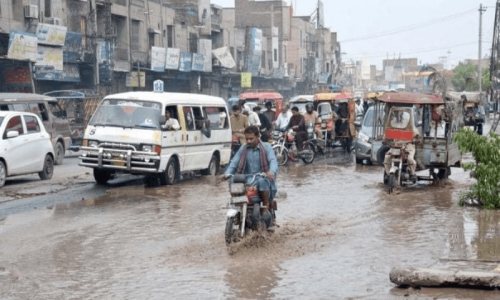
ISLAMABAD: The Pak-Afghan dialogue on peace and stability in Afghanistan faltered because of persisting differences over how to fight terrorism and questions about US role in it.
“What we are talking is how to bring peace and stability to the two countries (Afghanistan and Pakistan) and the region at large.
Our dialogue is at an advanced stage, we are discussing real issues. But what we have not come to as yet are the mechanisms we need to achieve the objective of a region free of extremism, radicalisation and violence it brings on us,” President Hamid Karzai said at his breakfast meeting with a group of journalists.
The other contentious issue, he said, was the role of US “as an important player” in the attainment of that goal.
Mr Karzai was reportedly involved in a heated exchange with Army Chief Gen Ashfaq Parvez Kayani and ISI Director General Lt-Gen Shuja Pasha at an earlier meeting at the Prime Minister’s House over allegations of presence of Taliban leaders in Pakistan.
Mr Karzai wouldn’t agree that the discussions turned acrimonious, but said the dialogue was “intellectually frank and solution oriented”. According to him, when he said something to Pakistan for “seeking solutions” in view of the country’s historical involvement in Afghanistan it was interpreted negatively.
The Afghan president, it is learnt, wanted Pakistan to deliver top Taliban leadership for peace talks. But sensing that wasn’t happening for now, he lost his temper at the meeting held to discuss ways of reviving joint efforts for peace and reconciliation in Afghanistan.
Clearly frustrated over what he described as “absence of clear steps to fight radicalism”, the Afghan leader warned that the region would remain prone to external intervention if Pakistan failed to rein in the radical elements.
“If we don’t want Nato to leave our region then continue with instability and radicalism,” he said and suggested that the only way forward for insulating the bilateral relationship from ‘accident proneness’ was an unreserved cooperation against the radicals, especially on both sides of the Durand Line.
It was one of those rare occasions that Mr Karzai set aside the customary diplomacy to publicly rule out accepting Pakistan’s offer to train Afghan military though he said that in principle he was in favour of it.
“First we must have an advanced state of relationship, which means peace and stability in Afghanistan; joint struggle against radicalism and its spread; and smoother relationship in which possibility of accidents or incidents that can throw our relationship into spin is removed.”
A high-ranking Afghan official speaking about the discussions with the Pakistani side claimed that Pakistanis no longer shied away from accepting links with the Taliban.
“The relationship with Taliban is clear. Fortunately, the government of Pakistan no longer denies that this relation exists,” he said. However, he did not elaborate what he meant by “links with Taliban”.
The government, in its public pronouncements, has always denied maintaining links with the group.
Foreign Minister Hina Rabbani Khar acknowledged that the bilateral session with Afghanistan did not proceed smoothly.
Speaking to journalists at a separate event, she said talks were difficult. “We need to have some hard talks.”
Dismissing the Afghan expectations about delivering Taliban supremo Mullah Omar for peace negotiations as “unrealistic and ridiculous”, she said if that was the case then there was no common ground to begin with.
Pakistan’s role in advancing peace and reconciliation in Afghanistan is considered critical both by the United States and the Karzai administration.
Islamabad and Kabul have for most part of the past 10 years of war on terror have had a tense relationship except for a brief period of bonhomie earlier last year, which ended with the assassination of High Peace Council Chief Prof Burhanuddin Rabbani that was blamed on elements based in Quetta.
In his breakfast meeting, Mr Karzai expressed satisfaction over the cooperation extended by Pakistan in investigating Prof Rabbani’s killing. Pakistani and Afghan investigation teams have visited each other’s country for the probe.
Mr Karzai said Pakistani authorities had arrested some of the people his government had identified as suspects in Mr Rabbani’s murder.










































Dear visitor, the comments section is undergoing an overhaul and will return soon.